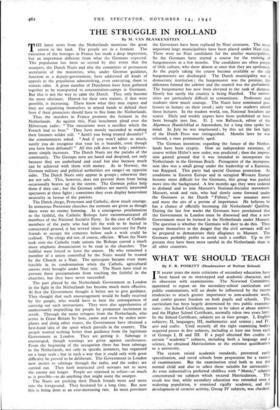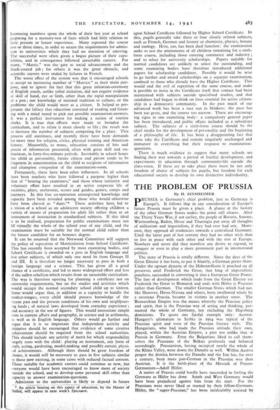WHAT WE SHOULD TEACH
By F. R. POSKITT (Headmaster of Bolton School)
IN recent years the main criticisms of secondary education have been based on its stereotyped and academic character, and its obsession with examinations. The Norwood Committee, appointed to report on the secondary-school curriculum and public examinations, will no doubt be influenced by the recent tendencies to attach greater importance to non-academic work, and confer greater freedom on both pupils and schools. The curriculum has been largely determined by two public examina- tions : the School Certificate, meant to be taken at about sixteen, and the Higher School Certificate, normally taken two years later. In the School Certificate, subjects are in four groups. I, English subjects; II, languages; III, mathematics and science ; and IV, arts and crafts. Until recently all the eight examining bodies required passes in five subjects, including at least one from each of Groups I, II and III. If a pupil obtained five credits in certain " academic " subjects, including both la language and a science, he obtained Matriculation or the entrance qualification to a university.
The system raised academic standards, prevented early specialisation, and saved schools from preparation for a variety of examinations. But the examination tried both to test the normal child and also to select those suitable for universities. As even industrialists preferred children with " Manic," schools concentrated –on subjects which secured Matriculation. The result was that, while secondary education was extended over a widening population, it remained rigidly academic, and the development of creative activity, Group IV subjects, was checked.
Increasing numbers spent the whole of their last year at school preparing for a memory-test of facts which had little relation to their present or future experience. Many repeated the course two or three times, in order to secure the requirements for admis- sion to universities which they had no intention of entering. The successful were often given a bogus picture of their capa- bilities, and in consequence followed unsuitable careers. For many, " Matric." was the-gate to social advancement and the black-coated job ; for others it was the great obstacle, and scientific careers were ended by failures in French.
The worst effect of the system was that it encouraged schools to accept an increasing number of " Matrics." as their main pur- pose, and to ignore the fact that this great initiation-ceremony of English youth, unlike tribal initiation, did not require evidence of skill of hand, eye or limb, other than the rapid manipulation of a pen ; nor knowledge of national tradition or culture, or the problems the child would meet as a citizen. It helped to per- petuate the fallacy that education consisted of reading and listen1 ing with a mind tuned to pick out possible examination-answers. It was a perfect instrument for making a nation of routine clerks. It is true that efforts were made to broaden the curriculum, and to relate it more closely to life ; the result was to increase the number of subjects competing for a place. This process still continues, and recently there have been demands for more time for religion, civics, physical training and American history. Meanwhile, to many, education consists of bits and pieces of information presented, often with great skill and en- thusiasm, in forty-five-minute periods. Inevitably in school hours the child as personality, future citizen and parent tends to be forgotten in concentration on the child as recipient of information and champion competitor of the examination-room.
Fortunately, there have been other influences. In all schools have been teachers who have followed a. purpose higher than that of " beating the examiners," and those whose initiative and voluntary effort have resulted in an active corporate life of societies, plays, orchestras, scouts and guides, games, camps and journeys. In this free co-operation unsuspected knowledge and capacity have been revealed among those who would otherwise have been classed as " duds."* These activities have led to a vision of a school as an adolescent society offering children ldren a variety of means of preparation for adult life rather than as an instrument of instruction in standardised subjects. If this ideal is to be realised, preparation for public examinations must not fill virtually the whole of the school year of any child, and the examination must be suitable for the normal child rather than the future candidate for an honours degree.
It can be assumed that the Norwood Committee will support the policy of separation of Matriculation from School Certificate. This has recently been accepted by most examining bodies, and School Certificate is awarded on a pass in English language and five other subjects, of which only one need be from Groups II and III. It is therefore no longer necessary to pass in both a foreign language and a science. This has given all a good chance of a certificate, and led to more widespread effort and less of the sullen rebellion which results from an unsuitable curriculum. The way is therefore opening for planning a certificate not on university requirements, but on the studies and activities which would occupy the normal secondary school child up to sixteen. Some would argue that, in addition to a capacity to handle the mother-tongue, every child should possess knowledge of the recent past and the present conditions of his own and neighbour- ing lands ; of natural laws developed from everyday experience ; and accuracy in the use of figures. This would necessitate simple tests in current affairs and geography, in science and in arithmetic, as well as in English language. Others would go further and argue that it is so important that independent activity and initiative should be encouraged that evidence of some creative achievement should be required from the school authorities.
This should include any activity of merit for which responsibility
largely rests with the child: playing an instrument, any _form of craft, acting, gardening, modelzmaking and possibly certain physi-
cal achievements. Although there should be great freedom of choice, it would still be necessary to pass in five subjects similar to those now existing, in some cases with reduced factual content.
Those suitable for academic careers could continue as now, but everyone would have been encouraged to know more of society outside the school, and to develop some personal skill other than capacity to answer examination-questions.
Admission to the • universities is likely to depend in future
* An article bearing on this aspect of education, by the Master of Balliol, will appear in newt week's Spectator.
upon School Certificate followed by Higher School Certificate. In this, pupils generally take three or four closely related subjects, such as French, German and history or chemistry, physics, botany and zoology. Here, too, has been dual function : the examination seeks to test the attainments of all children remaining for a sixth- form course, including those entering commerce and industry ; and to select for university scholarships. Papers suitable for normal candidates are unlikely to select the outstanding, and some examining bodies have therefore introduced additional papers for scholarship candidates. Possibly it would be wise to go further and award scholarships on a separate examination, confined to those who already have the Higher Certificate. This would end the evil of repetition of the same course, and make it possible to insist in the Certificate itself that contact had been maintained with subjects outside specialised studies, and that candidates had begun to think on lines essential for active citizen- ship in a democratic community. In the past much of our advanced work has been a race run in blinkers: the pace has been too great, and the course too narrow. There are encourag- ing signs in one examining body : a compulsory general paper has been introduced, and public affairs included as a subsidiary subject. The subjects of a sixth-form course should be the chief media for the development of personality and the beginning of a philosophy of life. It has been a disappointing fact that some take the Certificate and remain singularly unchanged and immature in everything but their response to examination- questions.
There is much evidence to suggest that many schools are finding their way towards a period of fruitful development, and experiments in education through community-life outside the class-room. If these are to take place there must be not only freedom of choice of subjects for pupils, but freedom for each educational society to develop its own distinctive individuality.























 Previous page
Previous page